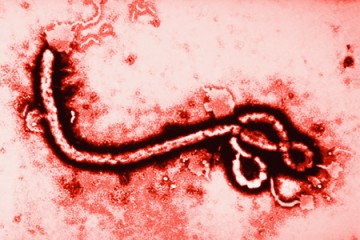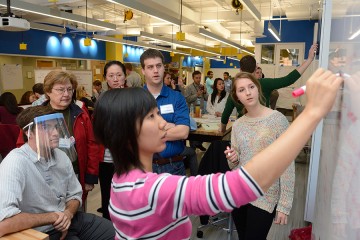The Johns Hopkins University's new personal protective suit for frontline health care workers in Ebola outbreaks was honored Monday as one of 10 finalists in the Social Good category of Fast Company's 2015 Innovation by Design Awards.
The suit, intended for use in future Ebola outbreaks like the 2014 epidemic that killed thousands in West Africa, has elements to keep the wearer more comfortable than existing suits, reduce the risk of coming in contact with the virus and protect against other infectious diseases.
Fast Company praised the design's prospects to do a "better job than current garments at keeping health care workers from coming in contact with Ebola patients' contagious body fluids."
"It includes a clear visor incorporated into the suit and air vents in the hood for keeping cool in hot climates," Fast Company said, "and, most ingeniously, a single rear zipper that easily causes the suit to peel away, without the contaminated exterior ever touching the wearer's skin."
The Johns Hopkins suit was one of more than 1,500 entries, in 13 categories, in this year's Innovation by Design showcase, Fast Company said on its website.
The project was led by the university's Center for Bioengineering Innovation Design and Jhpiego, the university's global health non-profit focusing on maternal and child health in the developing world, with support from Clinvue, a national innovation consultancy. The effort arose at the height of the Ebola outbreak in West Africa that killed more than 11,300 people at last count.
"Our PPE redesign happened because of the moving appeal issued last fall by the U.S. Agency for International Development to the wider design community to address the risks and hardship faced by Ebola care-givers," said Youseph Yazdi, executive director of CBID. "When we heard the USAID challenge, we met with our partners in global health innovation, Jhpiego, to rapidly organize a three-day Emergency Ebola Design Challenge to bring all of Johns Hopkins people into the effort."
The weekend hackathon brought together more than 60 faculty, staff and students from the university and contributors from the community, including a wedding dress designer whose shop is close to the university's Homewood campus.
"The event produced over 100 new concepts, and the best were selected for further development by a Johns Hopkins CBID-Jhpiego team," Yazdi said. "The team has made many refinements to the design over the past few months."
"As technical leaders in infection prevention and control and experts in building a skilled global health workforce," said Leslie Mancuso, Jhpiego president and CEO, "Jhpiego is incredibly proud of the suit and its potential to save the lives of nurses, midwives and other health providers around the globe who are dedicated to delivering quality care, often under challenging circumstances."
Early support was provided by Maryland's Department of Business and Economic Development, and then major support was awarded by the USAID Ebola Grand Challenge. The design team expects to announce soon an agreement with a company to manufacture and sell suits based on the design.
The winner in the Fast Company Social Good category was a project called the Ocean Cleanup, using "long, ingeniously designed floating barriers" to let ocean currents do the work of concentrating the estimated 5.25 trillion pieces of plastic product contaminating the oceans. Other finalists included the Golden West Humanitarian Foundation, the American Refugee Committee, and Frog Design.
The Center for Bioengineering Innovation and Design is part of the university's Whiting School of Engineering and Biomedical Engineering Department. CBID educates more than 100 graduate and undergraduate students each year in the design of effective solutions to a wide ranges of global health care challenges.









